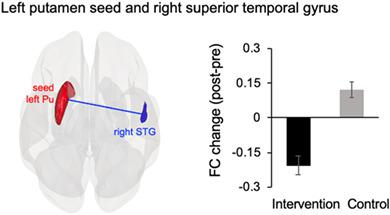当前位置:
X-MOL 学术
›
Hum. Brain Mapp.
›
论文详情
Our official English website, www.x-mol.net, welcomes your
feedback! (Note: you will need to create a separate account there.)
Musical instrument training program improves verbal memory and neural efficiency in novice older adults
Human Brain Mapping ( IF 3.5 ) Pub Date : 2020-12-08 , DOI: 10.1002/hbm.25298 Xia Guo 1, 2, 3 , Masatoshi Yamashita 2 , Maki Suzuki 2, 4 , Chie Ohsawa 5, 6 , Kohei Asano 5, 7 , Nobuhito Abe 5 , Takahiro Soshi 2 , Kaoru Sekiyama 2
Human Brain Mapping ( IF 3.5 ) Pub Date : 2020-12-08 , DOI: 10.1002/hbm.25298 Xia Guo 1, 2, 3 , Masatoshi Yamashita 2 , Maki Suzuki 2, 4 , Chie Ohsawa 5, 6 , Kohei Asano 5, 7 , Nobuhito Abe 5 , Takahiro Soshi 2 , Kaoru Sekiyama 2
Affiliation

|
Previous studies indicate that musical instrument training may improve the cognitive function of older adults. However, little is known about the neural origins of training‐related improvement in cognitive function. Here, we assessed the effects of instrumental training program on cognitive functions and neural efficiency in musically naïve older adults (61–85 years old). Participants were assigned to either the intervention group, which received a 4‐month instrumental training program using keyboard harmonica, or a control group without any alternative training. Cognitive measurements and functional magnetic resonance imaging during visual working memory (VWM) task were administered before and after the intervention in both groups. Behavioral data revealed that the intervention group significantly improved memory performance on the test that measures verbal recall compared to the control group. Neuroimaging data revealed that brain activation in the right supplementary motor area, left precuneus, and bilateral posterior cingulate gyrus (PCgG) during the VWM task decreased after instrumental training only in the intervention group. Task‐related functional connectivity (FC) analysis revealed that the intervention group showed decreased FC between the right PCgG and left middle temporal gyrus, and between the left putamen and right superior temporal gyrus (lPu‐rSTG) during a VWM task after the intervention. Furthermore, a greater improvement in memory performance in the intervention group was associated with a larger reduction in lPu‐rSTG FC, which might be interpreted as improved neural efficiency. Our results indicate that the musical instrument training program may contribute to improvements in verbal memory and neural efficiency in novice older adults.
中文翻译:

乐器训练计划提高了新手老年人的语言记忆和神经效率
先前的研究表明,乐器训练可能会改善老年人的认知功能。然而,对于与训练相关的认知功能改善的神经起源知之甚少。在这里,我们评估了乐器训练计划对音乐天真老年人(61-85 岁)的认知功能和神经效率的影响。参与者被分配到干预组(使用键盘口琴接受为期 4 个月的器乐训练计划)或没有任何替代训练的对照组。视觉工作记忆(VWM)任务期间的认知测量和功能磁共振成像在两组干预前后进行。行为数据显示,与对照组相比,干预组在测量言语回忆的测试中显着提高了记忆能力。神经影像学数据显示,仅在干预组进行器械训练后,在 VWM 任务期间右侧辅助运动区、左侧楔前叶和双侧后扣带回 (PCgG) 的大脑活动减少。任务相关功能连接 (FC) 分析显示,干预组在干预后的 VWM 任务期间,右侧 PCgG 和左侧颞中回之间以及左侧壳核和右侧颞上回 (lPu-rSTG) 之间的 FC 减少。此外,干预组记忆力的更大改善与 lPu-rSTG FC 的更大降低有关,这可能被解释为提高了神经效率。我们的结果表明,乐器训练计划可能有助于提高新手老年人的语言记忆和神经效率。
更新日期:2020-12-08
中文翻译:

乐器训练计划提高了新手老年人的语言记忆和神经效率
先前的研究表明,乐器训练可能会改善老年人的认知功能。然而,对于与训练相关的认知功能改善的神经起源知之甚少。在这里,我们评估了乐器训练计划对音乐天真老年人(61-85 岁)的认知功能和神经效率的影响。参与者被分配到干预组(使用键盘口琴接受为期 4 个月的器乐训练计划)或没有任何替代训练的对照组。视觉工作记忆(VWM)任务期间的认知测量和功能磁共振成像在两组干预前后进行。行为数据显示,与对照组相比,干预组在测量言语回忆的测试中显着提高了记忆能力。神经影像学数据显示,仅在干预组进行器械训练后,在 VWM 任务期间右侧辅助运动区、左侧楔前叶和双侧后扣带回 (PCgG) 的大脑活动减少。任务相关功能连接 (FC) 分析显示,干预组在干预后的 VWM 任务期间,右侧 PCgG 和左侧颞中回之间以及左侧壳核和右侧颞上回 (lPu-rSTG) 之间的 FC 减少。此外,干预组记忆力的更大改善与 lPu-rSTG FC 的更大降低有关,这可能被解释为提高了神经效率。我们的结果表明,乐器训练计划可能有助于提高新手老年人的语言记忆和神经效率。










































 京公网安备 11010802027423号
京公网安备 11010802027423号